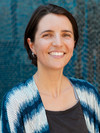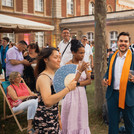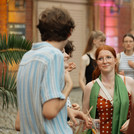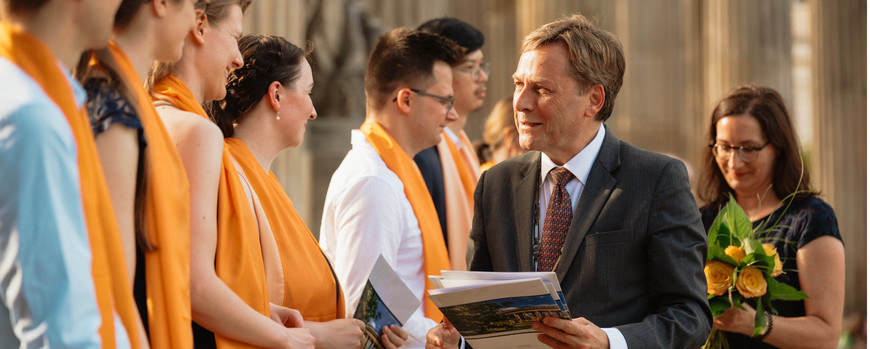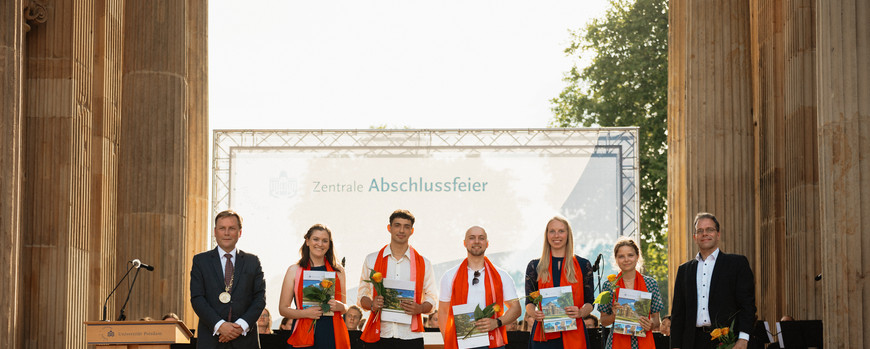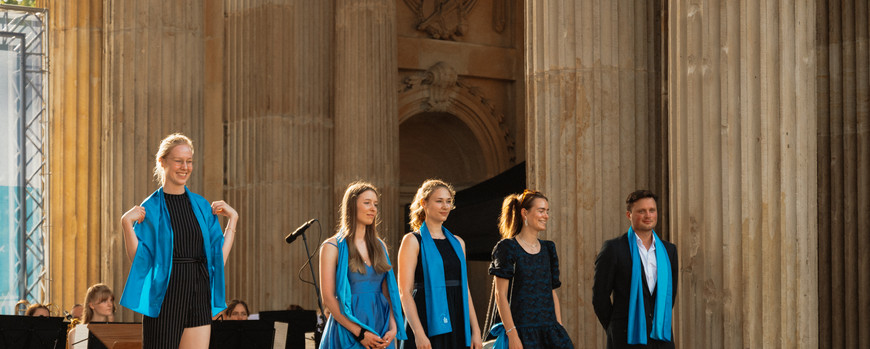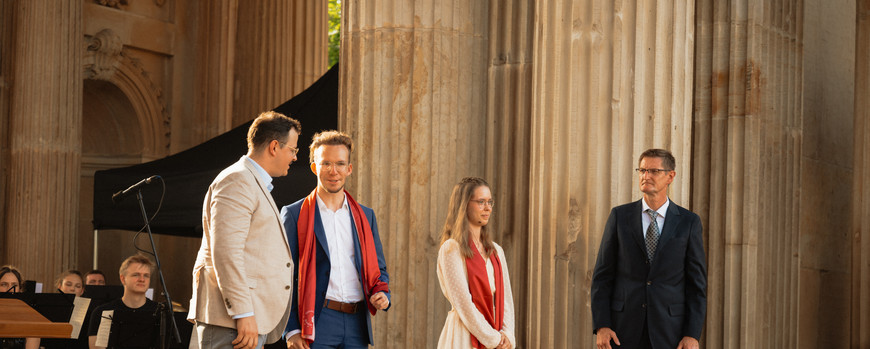Prizes and Honours
DAAD Prize for outstanding achievements of international students studying at German universities
This prize is sponsored by the Deutscher Akademischer Austauschdienst (Geman Academic Exchange Office) and the highest honours that are awarded to international students by Potsdam University. The students who receive it have shown exceptional academic achievements and remarkable social – especially intercultural – engagement. For them this distinction is a special acknowledgement of their achievements by Germany’s most prestigious funding organisation. At the same time the DAAD Prize emphasises the academic and cultural enrichment international students bring to a university community. With the annually awarded prize students receive 1000 €.
Anastasiia Alekseeva has received the DAAD Prize 2025. She is a master student of „Economic Policy and Quantitative Methods“ at the Faculty of Economics and Social Sciences. Before commencing her masters at Potsdam University she completed her bachelor’s degree in economics in Moscow. Alekseeva’s contributions to teaching far exceed the standard: her engagement in supporting and academically instructing younger students next to maintaining an excellent academic record were specifically acknowledged by the commission. She can imagine doing her doctorate degree at Potsdam University.
Universitätsgesellschaft Potsdam e. V. Prize for an Outstanding Dissertation 2024
With the graduation ceremony Universitätsgesellschaft Potsdam e.V. annually awards a prize to support young scientists: a prize for the most outstanding dissertation of the previous year. The prize is endowed with 2.500 €. Universitätsgesellschaft acknowledges special achievements that combine scientific excellence with broad relevance like societal implications, or potential for innovation in the dissertation. The prize creates a platform for courageous young research.
Dr. Berenike Blaser first completed her Master’s degree and then continued to her doctorate at the Division of Biological Psychology and Affective Science of Potsdam University. She receives the Universitätsgesellschaft Potsdam e. V. Prize for an Outstanding Dissertation 2024 for her dissertation „Premenstrual Symptoms as a function of altered central autonomous nervous activity“. Dr. Blaser engaged wit the topic from a bio-psychosocial perspective, meaning she investigated both physical and psychological processes. For her contribution to a field with only a small body of work Dr. Blaser receives the title “Most Outstanding Dissertation”. Additionally, the jury stressed her variety of methods and short time needed to complete her dissertation. Her work aims to help closing the gender-data-gap in her field since there is too little research and data on people who are not cis-men. Dr. Blaser is pleased to receive the honours as a symbol for societal change and appreciation for research in her field.
Graduate Prize
The annually awarded Graduate Prize of Potsdam University honours a Master graduate (or first juridical state examination) who displays high scientific potential and is especially suited to further academic education. The goal of the prize is to support young researchers and enable them to find their way into academics. It is endowed with 1.000 € and sponsored by Universitätsgesellschaft Potsdam e. V. The five nominees this year were Theresa Schültken (Faculty of Economics and Social Sciences), Julia Sophie Messner (Faculty of Science), Herrmann Siebel (Faculty of Human Sciences), Johannes Knechtges (Faculty of Arts) und Rome Sommerfeld (Digital Engineering Faculty).
Julia Sophie Messner, member of the Faculty of Science, receives the Graduate Prize 2025. She completes her master’s degree in Nutritional Science with a final grade of 1,0 and wrote her master’s thesis on »Influence of fatty acid quality and sex hormones on neuronal cell metabolism«. Nutrition is central to health. On one hand an oversupply of food can cause overweight and obesity, on the other hand ca. 70% of all new cases of Type 2 Diabetes result from a suboptimal diet. An unhealthy, high-calorie, high-fat diet reduces, specific to gender, the effect of insulin in the brain. To gain better insight, Ms Messner treated neural cells with sex hormones and different fatty acids (FA). There it showed that testosterone lowers sensitivity to insulin as well as cellular respiration. Additionally could be concluded that a FA’s saturation degree has deciding influence on neuronal metabolism.
»Ms Messner’s idea to examine the quality of fatty acids is scientifically interesting. Her choice to work with fatty acids that are components of important and appetizing Oils should be emphasized. Based on this her foundational research has the potential to have translational implications. […] Her results aim to be of help for testing new pre-clinical nutritional interventions that mitigate the metabolic derailment in obese patients,« reads the assessment.
Julia Sophie Messner already finished her bachelor’s degree with honors and completed her master’s degree as valedictorian of the Institute for Nutritional Science (INS). She is the first FastTrack PhD student at the INS and mentors other students parallel to her own studies. She shows her enthusiasm for research in public outreach like at Potsdam Day of the Sciences. The assessment also lauds Ms Messner’s motivation, commitment and voluntary participation in the advanced training program “Teaching Professionals” at Potsdam Graduate School. With the program she wants to gain early teaching experience as well as master teaching techniques. Therefore the assessment committee predict excellent perspectives for Ms Messner and have full faith she will have a successful academic career.
Read Julia Sophie Messner' Graduation Speech in English here.
Gallery of Award Ceremonies
Valedictorians
Digital Engineering Faculty
- Christoph Johannes Blumschein
- Anna-Birgitta Karen Burmeister
- Konrad Martin Letz
- Konrad Nareike
- Romeo Sommerfeld
- Luca Jakob Treide
Faculty of Human Sciences
- Nora Altendorf
- Tugce Aral
- Nicole Behrend
- Agnieszka Bien
- Johanna Dietrich
- Leo Erbach
- Anja Georgi
- Johan Hennert
- Alicia Chiara Jänsch
- Hannah Koßmann
- Finn Jonas Morgenroth
- Maximilian Rabe
- Frederike Schneider
- Sinika Timme
- Jaali Ulrich
- Felix Florian Müller
- Elina Rubertus
Faculty of Law
- Melcher Max Abramowski
- Manuela Behrendt
- Laura Blaake
- Lea Anna Gennari
- Vincent Kranz
- Hanna Kurrle
- Hanna Patala
- Jonas Willem Raetz
- Amelie Belisa Luise Reusch
- Noel Leon Schaller
Faculty of Sciences
- Alexander Bähr
- Lennart Grimm
- Richard Gundermann
- Johnny Hänsel
- Annika Högner
- Nicolas Jahn
- Jacqueline Jansen
- Anita Susann Krüger
- Max Lehmann
- Paula Lölsberg
- Milena Mensching
- Julia Sophie Meßner
- Joanna Sophie Radack
- Victoria Alejandra Rodríguez Oviedo
- Alisa Schreiber
- Nora Carolyn Schwärzler
- Leonna Szangolies
- Meike Wichmann
- Kerstin Heymann
- Karoline Kny
Faculty of Arts
- Paul Behne
- Avigail Ben Dor Niv
- Elliot Douglas
- Patricia Euler
- Nora Faust
- Josefine Gorgas
- Franziska Kleine
- Johanna Knechtges
- Florian Koch
- Katharina Langolf
- Sontje Liebner
- Leon Linke
- Aynur Mengi
- Raphael Nicolai
- Sujitha Prabhakar Parshi
- Alina Roth
- Quoi Röwer (Vorname wird “kwa“ ausgesprochen)
- Matthias Schulz
- Antonia Schwier
- Koyna Sinha Poduval
- Philipp Stieg
- Rebekka Wiesmeier
Faculty of Economics and Social Sciences
- Laura Virginia Bauschke
- Leon Jacob Caspar Beel
- Lilli Bollmacher
- Clara Bredenbrock
- Sascha Chein
- Joshua Elsässer
- Marvin Ernst
- Margarita Gladkaya
- Simon Göckeritz
- Maximilian Junkersdorf
- Nicolas Korjahn
- Eva Kreft
- Philipp Neuenfeldt
- Kathinka Schlieker
- Amy Sommerfeld
- Till Stadtbäumer
- Maja Toebs
- Karla Weikard
- Nicole Wiedemann



